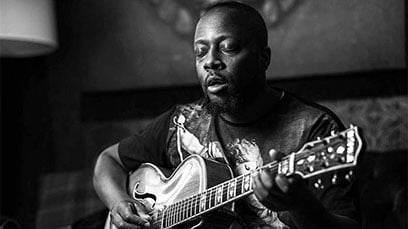
The music that Wyclef Jean has written, performed, and produced — both as a solo superstar and as founder and guiding member of the Fugees — has been a consistently powerful, pop cultural force for over two decades.
In 1996, the Fugees released their monumental album The Score, which inspired notoriously prickly rock critic Robert Christgau to write: “so beautiful and funny, its courage could make you weep.” The album, created in Wyclef’s studio in his uncle’s basement in New Jersey, hit No. 1 on the Billboard chart, spawned a trio of smash singles (including their indelible reinvention of Roberta Flack’s 1973 ballad “Killing Me Softly”), and is now certified six times platinum.
But Wyclef, a child prodigy with a wealth of musical influences from jazz to classic rock to reggae, resisted the pressure to duplicate the sound and style of that masterwork. Instead, he launched himself as a producer and solo artist whose work drew from an innovative and eclectic palette that included elements of pop, country, folk, disco, Latin, and electronic music.
Wyclef has been rewarded for his creativity and adventurousness with three Grammy Awards, a spot on the cover of Rolling Stone’s special “Top 50 Hip Hop Players,” and the opportunity to make music with such legends as Michael Jackson, Queen, Mick Jagger, Paul Simon, Earth, Wind & Fire, Kenny Rogers, and Tom Jones. As a solo artist, he has released six albums that have sold nearly nine million copies worldwide, including his 1997 debut The Carnival and 2000’s aptly titled The Ecleftic: 2 Sides II a Book, which even turned wrestling superstar/action hero The Rock into a pop star with the international hit single “It Doesn’t Matter.” Through it all, Wyclef kept an ear cocked for new talent. He helped launch Beyoncé´s career with Destiny’s Child’s early hit “No, No, No.
One couldn’t blame Wyclef for wanting to take time away from the spotlight given the whirlwind of press, good and bad, he received after announcing that he was going to run for president of Haiti in 2010, the summer after a massive earthquake killed over 200,000 people. “It felt like something I needed to do at the time,” he says. Wyclef flew home to help and saw the devastation firsthand. “Haiti was in dire need and I wasn’t going to go down in history as just another musician who did nothing and just hid behind the songs,” he says.
Born in Croix-des-Bouquets before moving to New Jersey at age nine, Wyclef has always kept very close ties to the Haitian people and continues to provide aid and consultation. His love for his native country was reciprocated by many and questioned by others. “I stepped into the fire,” he says. “People took shots at me, of course. But it’s better to be right than popular. And history will always reveal the truth. You can’t live for the fakeness or you will just be erased from time.” However, the fury and the frenzy of the election left him depleted. “When I got back to New York I was out of my mind,” he says. “I had just had a really tense experience. I thought I could change policy and legislation there, but coming back to America — yo, it hit me. I was like, ‘Man, what am I gonna do?’ I was at the height of my musical career. Nobody could stop me. I was moving like a bullet as a producer.”
(Read more at Wyclef)
